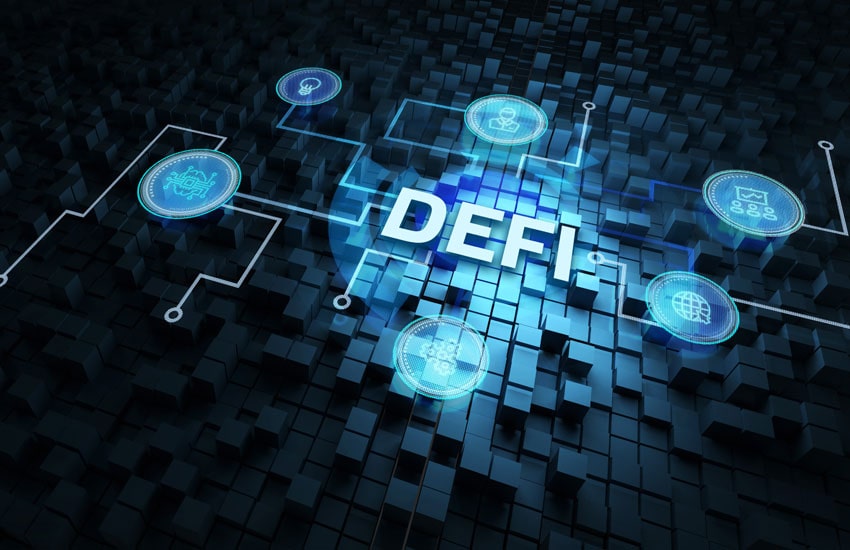Why can’t we give money to everyone on the earth as easily as we can email them? Or make a loan to them? According to Bitkom, a German technology trade organization, these concerns are at the heart of the beliefs, practices, and goals that drive decentralized finance (DeFi). These concepts have ignited the “DeFi Revolution” and fueled the quick growth of new unicorns like AirTech and MakerDAO in recent years. As a result, more and more young age entrepreneurs can startup their own Defi Development Company to generate new revenue streams and run their businesses.
Understanding The Defi Revolution
DeFi, which was launched in 2015 on the Ethereum blockchain, is built on distributed ledger technology and is fast growing. Its shared purpose is to develop and operate without the use of traditional intermediaries like banks, payment service providers, or investment funds while yet being able to supply traditional banks and investment firms with financial services like loans, margin trading, and portfolio management.
The popularity of DeFi can be attributed to its consumer appeal. Consumers do not require a government-issued ID, a social security number, proof of address, or other comparable papers to access financial products on public decentralized blockchain networks. Regulators will very certainly need KYC (Know Your Client) and AML (Anti Money Laundering) processes when DeFi ventures like crypto wallets and exchanges expand in scale, thus a government-issued ID will still be required for several of the larger sites.
How Is Defi Now Used
Defi is increasingly being used in both simple and complex financial operations. It is powered by decentralized applications known as “dapps” or other programs known as “protocols.” Dapps and protocols facilitate transactions in the two largest cryptocurrencies, Bitcoin (BTC) and Ethereum (ETH) (ETH).
While Bitcoin is the most popular cryptocurrency, Ethereum is far more adaptable to a wider range of purposes, which means Ethereum-based code is used in a vast number of dapps and protocols.
Here Are Some Examples Of How Dapps And Protocols Are Now Being Used:
1. Traditional Financial Transactions: Defi is being utilized for everything from payments to trading equities and insurance to lending and borrowing.
2. Decentralized Exchanges (DEXs): The majority of bitcoin investors presently use centralized exchanges such as Coinbase or Gemini. DEXs let users to make peer-to-peer financial transactions while preserving control over their cash.
3. E-Wallets: Defi Development Company is developing digital wallets that can work independently of the major cryptocurrency exchanges, allowing investors to access everything from coins to blockchain-based games.
4. Stable Coins: Unlike cryptocurrencies, stable coins attempt to maintain their pricing by linking them to non-crypto currencies such as the US dollar.
5. Harvesting Yields: Defi, sometimes known as “rocket fuel,” enables speculative investors to lend crypto and potentially benefit handsomely when the proprietary coins Defi borrowing platforms pay them for consenting to the loan rise rapidly.
6. Non-Transferable Tokens (NFTs): NFTs convert non-tradable items, such as slam dunk footage and Twitter’s first tweet, into digital assets. NFTs make the hitherto uncommodifiable commodifiable.
7. Quick Loans: These are cryptocurrency loans in which funds are borrowed and repaid in a single transaction. Sounds weird, doesn’t it? This is how it works: Borrowers can earn by entering into a contract written on the Ethereum blockchain that borrows funds, executes a transaction, and repays the loan instantly—no lawyers required.
If the transaction cannot be completed or would result in a loss, the funds are automatically returned to the lender. If you make a profit, you can retain it after deducting any interest or fees. Consider flash loans to be a sort of decentralized arbitrage.
The Defi market evaluates adoption by calculating locked value, which determines how much money is now operating in various Defi protocols. Defi protocols presently have a total locked value of about $43 billion.
The rapid expansion of blockchain fuels Defi – decentralised finance adoption: a dapp is globally available the moment it is encoded on the blockchain. While most centralized financial instruments and technologies grow through time and are constrained by regional laws and regulations, dapps operate outside of these restrictions, raising their potential value while also increasing their risks.
The Gains Of Defi
DeFi has a diverse set of applications, many of which are not covered by traditional fiat-based financial systems. Here are a few benefits of DeFi – decentralised finance:
Defi Is Permissionless And Open Source
Defi – Decentralised finance services are available to everyone, regardless of location, who has a crypto wallet and an internet connection. Users can also conduct transactions and transfer assets without having to wait for bank transfers or pay regular bank fees. (However, other crypto-specific expenditures, such as gas fees, may exist.)
Transactions in real time are possible. Every minute, the underlying blockchain is updated, and interest rates are modified numerous times.
Transparency In Transactions Data
Every transaction on the Ethereum blockchain, which accounts for more than 90% of all DeFi traffic, is broadcast to and validated by other network users. With this level of transaction data transparency, any user may view network activity. Users’ assets can be safeguarded using non-custodial crypto wallets or smart contract-based escrow.
Smart Contracts Are Highly Programmable and can be set to run automatically based on an infinite number of variables. Decentralised finance data is tamper-proof, safe, and auditable due to the use of blockchain architecture.
Many Defi Protocols Are Available For Free
Ethereum and other projects use open-source code, which anybody may see, audit, and alter. Developers can connect numerous DeFi applications built on open-source technology to create new financial goods and services without the requirement for authorization.
Conclusion
Decentralized finance has emerged as a strong contender for altering traditional financial services norms. I hope you learned everything you needed to know about Defi from this blog. As can be seen, the Defi market is still booming. With each passing day, the number of people interested in participating in this exciting process grows. If you need any help getting Defi Smart Contract Development services, feel free to contact us.
